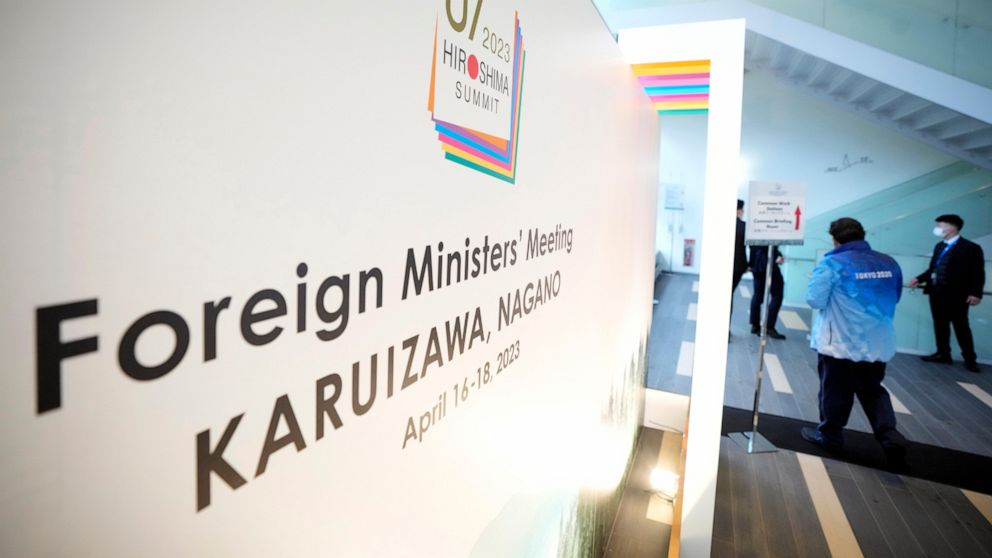Global Courant 2023-04-16 10:47:16
SAPPORO, Japan — Energy and environment ministers from the Group of Seven Rich Countries pledged on Sunday to work to accelerate the transition to cleaner, renewable energy, but did not set a timetable for phasing out coal-fired power stations as they held two days of talks in the northern Japanese completed city. from Sapporo.
The G-7 officials have issued a communiqué with their commitments. The 36-page document was prepared ahead of a G-7 summit to be held in Hiroshima in May.
Japan received support from fellow G-7 countries for its own national strategy that emphasizes so-called clean coal, hydrogen and nuclear power to help ensure its energy security.
“We recognize the current global energy crisis and economic disruptions and reaffirm our commitment to accelerate the clean energy transition to net zero greenhouse gas (GHG) emissions by 2050,” the statement said.
It said leaders recognized the importance of finding efficient, affordable and diverse energy sources, which “underline our commitment to take immediate, short and medium-term action in this critical decade.”
The call to action comes as China and other developing countries ramp up demands for more help to phase out fossil fuels and stabilize energy prices and supplies amid disruptions caused by Russia’s war on Ukraine.
The issue of establishing a timeline for phasing out coal plants has been a longstanding sticking point. Japan relies on coal for nearly a third of its energy generation and also promotes the use of so-called clean coal, which uses technology to capture carbon emissions, to produce hydrogen – which only produces water when used as a fuel.
The document published on Sunday reiterated the need to urgently reduce carbon emissions and achieve a “predominantly low-carbon energy sector” by 2035.
The stipulation that it is “predominantly” clean energy leaves room for a continuation of energy based on fossil fuels. But ministers agreed to prioritize steps towards phasing out “unmitigated” coal-fired power stations – those that don’t use mechanisms to capture emissions and prevent them from escaping into the atmosphere.
“We call for and will work with other countries to terminate new unabated coal-fired power generation projects worldwide as soon as possible to accelerate the clean energy transition in an equitable manner,” the document said.
The G-7 countries account for 40% of the world’s economic activity and a quarter of global carbon emissions. Their actions are crucial, but so is their support for less prosperous countries that often experience the worst impacts of climate change, while having the fewest resources to mitigate such impacts.
Emissions in advanced economies are falling, although historically they have been higher – the United States alone is responsible for about a quarter of historical global carbon emissions – while emerging markets and emerging economies now account for more than two-thirds of global carbon emissions.
The presidential candidate for the next United Nations climate talks, COP28, who was also present at the talks in Sapporo, issued a statement urging the G-7 countries to increase financial support for the transition of developing countries to clean increase energy.
Sultan Al Jaber urged his fellow leaders to help broker a “new deal” on climate finance to boost efforts to mitigate and adapt to the impacts of climate change, and to protect biodiversity help protect, especially in developing countries.
“We need to make a fairer deal for the Global South,” he said. “There is not enough to reach the people and places that need it most.”
He said developed countries should honor a $100 billion pledge they made at the 2009 COP15 meeting. The next talks will take place in Dubai at the end of November.
Chinese President Xi Jinping and Brazilian President Luiz Inácio Lula da Silva issued a joint statement saying, “We remain deeply concerned that developed country financing will continue to fall short of its $100 billion a year commitment.”
Lula met with Xi in Beijing on Friday.
Economic development is the first defense against climate change, Bhupender Yadav, India’s environment minister, said in a tweet.
“The global goal of reaching net zero by 2050 requires improved emission descaling by developed countries,” Yadav said. “This will provide space for countries like India to achieve the development needed for its people, which will provide the needed defense against the impacts of climate change, environmental degradation and pollution.”
Al Jaber urged international financial institutions to better support efforts to minimize and mitigate climate change given the need to massively and rapidly increase renewable energy generation capacity.
As G-7 energy and environment ministers wrapped up their two-day meetings in Sapporo, further south in the mountain town of Karuizawa, G-7 foreign ministers grappled with other shared concerns, including regional security and the war in Ukraine.
(TagsToTranslate)Clean Coal Technology








